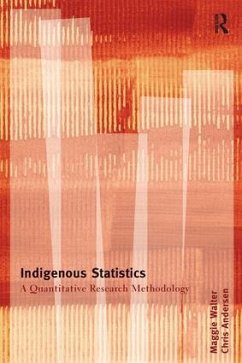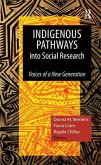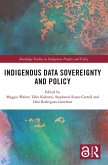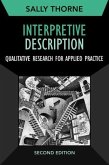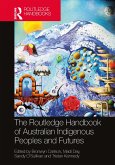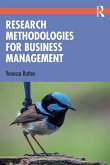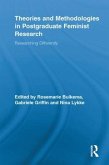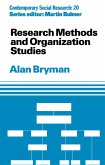Maggie Walter, Chris Andersen (Canada University of Alberta)
Indigenous Statistics
A Quantitative Research Methodology
Maggie Walter, Chris Andersen (Canada University of Alberta)
Indigenous Statistics
A Quantitative Research Methodology
- Broschiertes Buch
- Merkliste
- Auf die Merkliste
- Bewerten Bewerten
- Teilen
- Produkt teilen
- Produkterinnerung
- Produkterinnerung
The first book on Indigenous quantitative methodologies, this concise, accessible text opens up a major new approach for research across the disciplines and applied fields.
Andere Kunden interessierten sich auch für
![Indigenous Pathways into Social Research Indigenous Pathways into Social Research]() Indigenous Pathways into Social Research62,99 €
Indigenous Pathways into Social Research62,99 €![Indigenous Data Sovereignty and Policy Indigenous Data Sovereignty and Policy]() Indigenous Data Sovereignty and Policy45,99 €
Indigenous Data Sovereignty and Policy45,99 €![Interpretive Description Interpretive Description]() Sally ThorneInterpretive Description59,99 €
Sally ThorneInterpretive Description59,99 €![The Routledge Handbook of Australian Indigenous Peoples and Futures The Routledge Handbook of Australian Indigenous Peoples and Futures]() The Routledge Handbook of Australian Indigenous Peoples and Futures245,99 €
The Routledge Handbook of Australian Indigenous Peoples and Futures245,99 €![Research Methodologies for Business Management Research Methodologies for Business Management]() Vanessa RattenResearch Methodologies for Business Management47,99 €
Vanessa RattenResearch Methodologies for Business Management47,99 €![Theories and Methodologies in Postgraduate Feminist Research Theories and Methodologies in Postgraduate Feminist Research]() Theories and Methodologies in Postgraduate Feminist Research69,99 €
Theories and Methodologies in Postgraduate Feminist Research69,99 €![Research Methods and Organization Studies Research Methods and Organization Studies]() Alan BrymanResearch Methods and Organization Studies54,99 €
Alan BrymanResearch Methods and Organization Studies54,99 €-
-
-
The first book on Indigenous quantitative methodologies, this concise, accessible text opens up a major new approach for research across the disciplines and applied fields.
Produktdetails
- Produktdetails
- Verlag: Left Coast Press Inc
- Seitenzahl: 160
- Erscheinungstermin: 15. September 2013
- Englisch
- Abmessung: 229mm x 152mm x 9mm
- Gewicht: 242g
- ISBN-13: 9781611322934
- ISBN-10: 1611322936
- Artikelnr.: 36875756
- Herstellerkennzeichnung
- Libri GmbH
- Europaallee 1
- 36244 Bad Hersfeld
- gpsr@libri.de
- Verlag: Left Coast Press Inc
- Seitenzahl: 160
- Erscheinungstermin: 15. September 2013
- Englisch
- Abmessung: 229mm x 152mm x 9mm
- Gewicht: 242g
- ISBN-13: 9781611322934
- ISBN-10: 1611322936
- Artikelnr.: 36875756
- Herstellerkennzeichnung
- Libri GmbH
- Europaallee 1
- 36244 Bad Hersfeld
- gpsr@libri.de
Maggie Walter is a Trawlwoolway woman of the Pymmerrairrener nation of north east Tasmania and an Associate Professor with the School of Sociology at the University of Tasmania. Her scholarship focus is inequality and race relations with Indigenous peoples at the centre of her research and she teaches and publishes across these areas. Her books include Social Inequality in Australia: Discourses, Realities and Futures (with Daphne Habibis, Oxford University Press, 2008) and Social Research Methods (2006; 2010; 2013 Oxford University Press). Maggie is co-editor (with Aileen Moreton-Robinson) of the International Journal of Critical Indigenous Studies, an elected member of the Research Advisory Council of the Australian Institute of Aboriginal and Torres Strait Islander Studies (AIATSIS), and a long term Steering Committee Group for the large-scale Australian Longitudinal Study of Indigenous Children (LSIC), Footprints in Time Study. She is also currently engaged in an on-going project embedding Indigenous research methodologies into post-graduate programs in Australian universities.Chris Andersen is Michif (Metis) and an Associate Professor in the Faculty of Native Studies at the University of Alberta. He is interested in the ways in which the Canadian nation-state has created "identity" categories relating to Aboriginal communities. He is a member of Statistics Canada's Advisory Committee on Social Conditions, the Office of the Federal Interlocutor for Métis and non-status Indian's Research Advisory Circle, the co-Chair of the Urban Aboriginal Strategy's Wicihitowin Research Action Circle, and editor of the journal Aboriginal Policy Studies.
Introduction Chapter 1: Deficit Indigenes Chapter 2: Conceptualizing
Quantitative Methodologies Chapter 3: The Paradigm of Indigenous
Methodologies Chapter 4: nayri kati ("Good Numbers")-Indigenous
Quantitative Methodology in Practice Chapter 5: Indigenous Quantitative
Methodological Practice-Canada Chapter 6: Conclusion-Indigenous Peoples and
Statistics
Quantitative Methodologies Chapter 3: The Paradigm of Indigenous
Methodologies Chapter 4: nayri kati ("Good Numbers")-Indigenous
Quantitative Methodology in Practice Chapter 5: Indigenous Quantitative
Methodological Practice-Canada Chapter 6: Conclusion-Indigenous Peoples and
Statistics
Introduction Chapter 1: Deficit Indigenes Chapter 2: Conceptualizing
Quantitative Methodologies Chapter 3: The Paradigm of Indigenous
Methodologies Chapter 4: nayri kati ("Good Numbers")-Indigenous
Quantitative Methodology in Practice Chapter 5: Indigenous Quantitative
Methodological Practice-Canada Chapter 6: Conclusion-Indigenous Peoples and
Statistics
Quantitative Methodologies Chapter 3: The Paradigm of Indigenous
Methodologies Chapter 4: nayri kati ("Good Numbers")-Indigenous
Quantitative Methodology in Practice Chapter 5: Indigenous Quantitative
Methodological Practice-Canada Chapter 6: Conclusion-Indigenous Peoples and
Statistics

